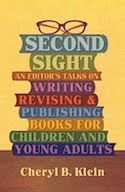I had a nice exchange over e-mail recently with a writer who read Second Sight and felt a little bit unclear (quite understandably!) about a couple of concepts promulgated in the book; and I decided to post our correspondence here to help clarify the ideas for anyone else who might be interested and/or confused. To wit, here's my correspondent:
At first I wasn’t sure whether you were saying a book needs both a thematic point and an emotional point or just one, but I believe you mean the book has a single point and it can be either of the two.
Also, I was a little muddled about the emotional point itself. I wondered if the emotional point is the intended emotional response to the book’s resolution, or is it the reason a person chooses to read that particular book in the first place. Your example of the humor that is essential to Pilkey’s books makes me think it must be the latter.
I spent some time pondering the Compulsion vs. Obstacles section of “Four Techniques to Get at the Emotional Heart of Your Story” and wanted very much to hear you expound upon the “emotional pattern” that a character is compelled to repeat over and over. I’m not certain what an emotional pattern is. Is it something like a tendency to be impulsive, stubborn, zealous, etc.? Or is it the driving emotional force behind most of the character’s actions, like love or anger?
These were just tiny questions gnawing at me as I read Second Sight, but the *emotional pattern* I repeated over and over was exhilaration at the clarity and the little epiphanies I experienced and a bit of a brain fry as I tried to pin down the point of my story. That simple plot checklist was so helpful (thanks!)My response:
Thanks for your questions -- they're good ones!
Actually, I think novels (literary fiction, anyway) should have both Thematic and Emotional Points -- a philosophical thought or idea or question driving the book (a question answered through its events), its intellectual heart; and then the emotional heart, which should be the Emotional Point.
When I'm working over a manuscript and I say "What's its Emotional Point?", my answers tend to go toward the overall emotional atmosphere of the novel, the key feeling the author intends the reader to take away at the end. (I make absolutely no claim to this being clear in the book.) In Pride and Prejudice, I would say its emotional point is humor, amusement, that sideways & smiling look at the foibles of intelligent human beings. In Twilight, I would say it's that feeling of being caught up in falling in love, and the reader's being in love with Edward too. In Feed, I would say it's that gaping, yawning, despairing feeling at the emptiness of the society and the lack of connection that Silas has at the end. (So yes, it's more of the intended emotional response to the book's resolution, as you put it.)
It's also often the author's intended emotional reaction to the idea espoused by the Thematic Point . . . For instance, in Pride and Prejudice, the Thematic Point is that even smart people sometimes get caught up in their own smartness and act stupidly, but rather than treating that with rage or despair (like, say, Dostoyevsky or Vonnegut might), Austen laughs at it and creates a happy ending. And that laughter, which she hopes to inspire in readers in turn, is the Emotional Point. In the classical Well-Made Novel, everything in the book should help add up to that feeling on the emotional side and the Thematic Point on the intellectual side.
As for the emotional pattern, I'd say it's a combination of those two things you describe . . . It's the outward behavioral tendency to hide, run away, be silent, be angry, fight, hit, whatever, which is driven by some inward emotional force (or pain, usually) in the character's nature or experience. In Speak, for instance, Melinda is silent and hides as much as possible for most of the book, because she believes no one will listen to her after her experience at the party; so silence/hiding is the emotional pattern she repeats again and again, coming up against the obstacles of people who WILL listen, who DO value her words (and also the obstacles of situations in which she SHOULD speak out), until those things give her the courage at the climax to change her pattern and name what happened to her. Or Pride and Prejudice again: Lizzy's pattern is to be prejudiced and pleased with herself, until she comes up against the obstacle of being massively wrong about Darcy and Wickham, and having to recognize all the other obstacles she bypassed to continue to be massively pleased with herself. . . .
This pattern does not necessarily apply to every novel; it's much more useful for character-driven books where the character needs to make some emotional change than plot-driven ones, where the change is mostly external. (I don't think you really find it in Harry Potter, for instance, at least not on the single-book level.) But if you can identify that key thing your protagonist does over and over again, especially in response to a threat, it's often quite useful in unlocking his/her nature and what might need to change for him/her to move forward emotionally, to grow.If you've read Second Sight and you have questions or ideas you'd like to see explicated more, do feel free to leave a comment about them here. I continue to revise the underlying talks whenever I give them (and who knows, maybe there'll be a second edition of the book someday), so it's always nice to get feedback on what needs more explanation/examples, where I got too much into theory and not enough into practice, what's working well and what isn't, etc. Thanks!












